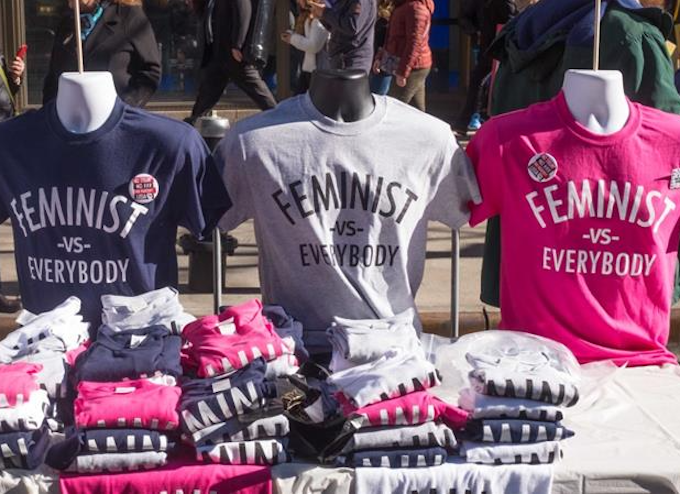
ANALYSIS: By Catherine Rottenberg
A few days ago, I received a message from my son’s secondary school announcing that it would be celebrating International Women’s Day (IWD) on Friday. The message read:
“The school is selling Feminist jumpers to mark the event. Jumpers are on sale for 10 pounds ($13) – please ask your daughter or son to bring 10 pounds cash to the English office if she/he would like to wear one.”
A few hours later a friend called to tell me, tongue-in-cheek, that International Women’s Day t-shirts are passe and that sex toys are the new t-shirts, sending me a link to “IWD sex toys” currently on sale.
READ MORE: More International Women’s Day articles – Al Jazeera
The irony is that International Women’s Day began as an initiative of the Socialist Party of America to honour the 1908 garment workers’ strike in New York, which, at the time, was the biggest industrial action ever taken by women workers in the United States.
Hence, the dedication of a day to women began as a struggle against capitalist economic exploitation, where women demanded better working conditions and higher wages.
It is true that, over the course of the 20th century, International Women’s Day has undergone many transformations. In certain countries and contexts, it has served as a day simply to celebrate women and their accomplishments.
It has also been a catalyst to mobilise women around the world to rally for a variety of political causes: from working women’s rights through the right to vote and participate in politics to anti-war protests and, more recently, gender equality.
Problematic tokenism
There is, of course, always a certain problematic tokenism when setting aside one day during the year in which we either celebrate women and/or protest gender inequality.
But in the past few years, and particularly with the rise of Trumpism and the far-right across Europe, South America, India and many other places, International Women’s Day has taken on increased potency and significance.
Indeed, the demonstrations organised today, March 8, across the globe have become more militant and intersectional since 2016.
One has only to think of Spain, where last year millions walked out to protest against gender inequality and sexual discrimination, or the US, where the Feminism for the 99 percent movement called for a women’s strike.
The agendas of many of these protests go well beyond “equality”: They are demanding gender, racial, economic, and climate justice, understanding that these issues are inextricably linked.
And yet, as the message from my son’s school and the IWD sex toys reveal, alongside the more militant direction of International Women’s Day, there has also been another parallel development, namely, the increasing commodification of March 8 and its branding by corporations.
Solidarity by shopping, not struggle
Scholars call this brand activism, where corporations attempt to improve their reputation by using some popular and often progressive cause in their PR and advertising campaigns. The businesses and corporations thus give in order to get.
An example of this is the fashion e-tailer Net-a-Porter which has launched an exclusive limited-edition collection of IWD T-shirts in collaboration with six women designers. It is true that all of the profits go to a charity supporting women survivors of war, but activism and empowerment here is equated with buying an expensive t-shirt with words like “You Go Girl”.
Women, in other words, are encouraged to express their solidarity not through struggle or protest, but by shopping.
This corporate appropriation is clearly part of a wider cultural phenomenon – the rise of neoliberal feminism.
This kind of feminism encourages women to invest in themselves and their own aspirations, inciting them to build confidence and “lean in”. And while such feminism acknowledges the gendered wage gap and sexual harassment as signs of continued inequality, the solutions they posit, such as encouraging individual women to take responsibility for their own well-being, do not challenge the structural and economic undergirding of these phenomena.
Neoliberal feminism is palatable and marketable precisely because it is a non-threatening feminism. It doesn’t address the devastation wrought by neoliberal capitalism, neo-imperialism or systemic misogyny and sexism, so it is easy to embrace and it sells well on the marketplace.
Its message is the exact opposite of the one advanced by the women’s strikes at the beginning of the 20th century.
Feel-good feminism
Moreover, given the rise of this feel-good feminism, it is not hard to understand why suddenly everyone is eager to claim the “feminist” label: from movie stars like Emma Watson to Canadian Prime Minister Justin Trudeau.
Nor is it difficult to understand why this feminism makes good business today.
The popularity of feminism and its widespread embrace is not a bad thing per se. But it is crucial to understand what kind of feminism has become popular and why.
A watered down and defanged feminist message is neither going to uproot patriarchy, nor is it going to help us resolve the existential threats to life on earth.
We thus have two competing forces at work at the moment. On the one hand, we have a popular, commodity-driven feminism that serves as a handmaiden to neoliberalism.
On the other hand, we have a growing movement of mass feminist mobilisation that is demanding transformative social justice.
In the US, such mass mobilisation has been spearheaded by activists like Alicia Garza, who is one of the cofounders of Black Lives Matter and Linda Sarsour, who was cochair of the 2017 Women’s March, the 2017 Day Without a Woman, as well as the 2019 Women’s March.
Their feminism is a threatening one because it challenges the intersecting systems of oppression: from white supremacy through Islamophobia to misogyny and neoliberal capitalism. These women carry on the revolutionary spirit that sparked the first IWD over a century ago.
Which feminism “wins” in many ways depends on us. I, for one, have made my choice. Today, I will join the Global Women’s Strike and will bring my two sons along.
Dr Catherine Rottenberg is an associate professor of American Studies at the University of Nottingham. This article was first published by Al Jazeera English.











































